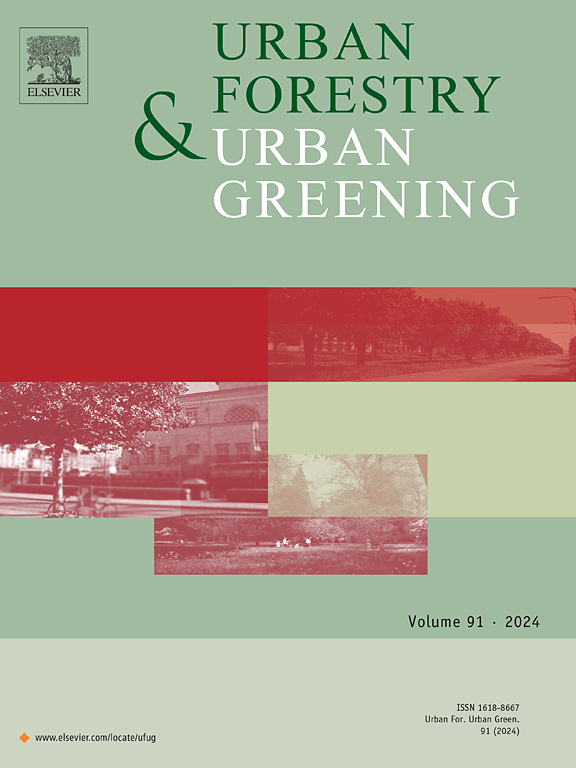Leveraging nature for just cities: Planning nature-based solutions in Greece
IF 6
2区 环境科学与生态学
Q1 ENVIRONMENTAL STUDIES
引用次数: 0
Abstract
An unequal distribution of green areas across cities coupled with the vulnerability towards climate change and global warming is causing segregation between residents who profit from nature-based solutions’(NbS) health and wellbeing benefits and those who do not. Residential segregation in urban settings goes far beyond income and socio-economic factors and is also evident in questions of environmental justice, participation and power – including how and where NbS are implemented. Delving into Greek cities, this paper raises the question of whether and how engagement with urban NbS differs within cities and among their residents. By applying a survey with an integrated discrete choice experiment (N = 1002) we were able to analyze the relevance of the type of green area, the effectiveness in temperature and microdust reduction, biodiversity enhancement, time and financial payments and the importance of participatory planning processes. The latent class analysis showed that urban segregation is recognizable within the sample. By investigating the differences in ability and willingness to support urban NbS, this paper recommends how green infrastructure can be implemented in a manner which enforces a more just distribution for those who need it most.
利用自然创造城市:在希腊规划基于自然的解决方案
城市间绿地分布不均,再加上气候变化和全球变暖的脆弱性,导致从基于自然的解决方案(NbS)的健康和福祉中受益的居民和没有受益的居民之间出现了隔离。城市环境中的居住隔离远远超出了收入和社会经济因素,在环境正义、参与和权力问题上也很明显——包括国家统计局的实施方式和地点。通过对希腊城市的深入研究,本文提出了一个问题,即城市内部和居民之间对城市国家统计局的参与是否不同,以及如何不同。通过采用一项综合离散选择实验(N = 1002)的调查,我们能够分析绿地类型、降低温度和微尘的有效性、增强生物多样性、时间和财务支付以及参与式规划过程的重要性之间的相关性。潜在类别分析表明,城市隔离在样本中是可识别的。通过调查支持城市国家统计局的能力和意愿的差异,本文建议如何以一种更公平地分配给最需要它的人的方式实施绿色基础设施。
本文章由计算机程序翻译,如有差异,请以英文原文为准。
求助全文
约1分钟内获得全文
求助全文
来源期刊

Urban Forestry & Urban Greening
FORESTRY-
CiteScore
11.70
自引率
12.50%
发文量
289
审稿时长
70 days
期刊介绍:
Urban Forestry and Urban Greening is a refereed, international journal aimed at presenting high-quality research with urban and peri-urban woody and non-woody vegetation and its use, planning, design, establishment and management as its main topics. Urban Forestry and Urban Greening concentrates on all tree-dominated (as joint together in the urban forest) as well as other green resources in and around urban areas, such as woodlands, public and private urban parks and gardens, urban nature areas, street tree and square plantations, botanical gardens and cemeteries.
The journal welcomes basic and applied research papers, as well as review papers and short communications. Contributions should focus on one or more of the following aspects:
-Form and functions of urban forests and other vegetation, including aspects of urban ecology.
-Policy-making, planning and design related to urban forests and other vegetation.
-Selection and establishment of tree resources and other vegetation for urban environments.
-Management of urban forests and other vegetation.
Original contributions of a high academic standard are invited from a wide range of disciplines and fields, including forestry, biology, horticulture, arboriculture, landscape ecology, pathology, soil science, hydrology, landscape architecture, landscape planning, urban planning and design, economics, sociology, environmental psychology, public health, and education.
 求助内容:
求助内容: 应助结果提醒方式:
应助结果提醒方式:


